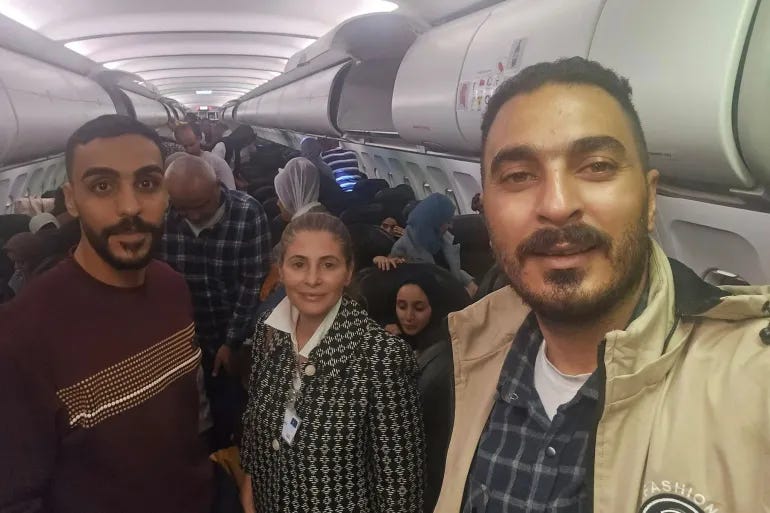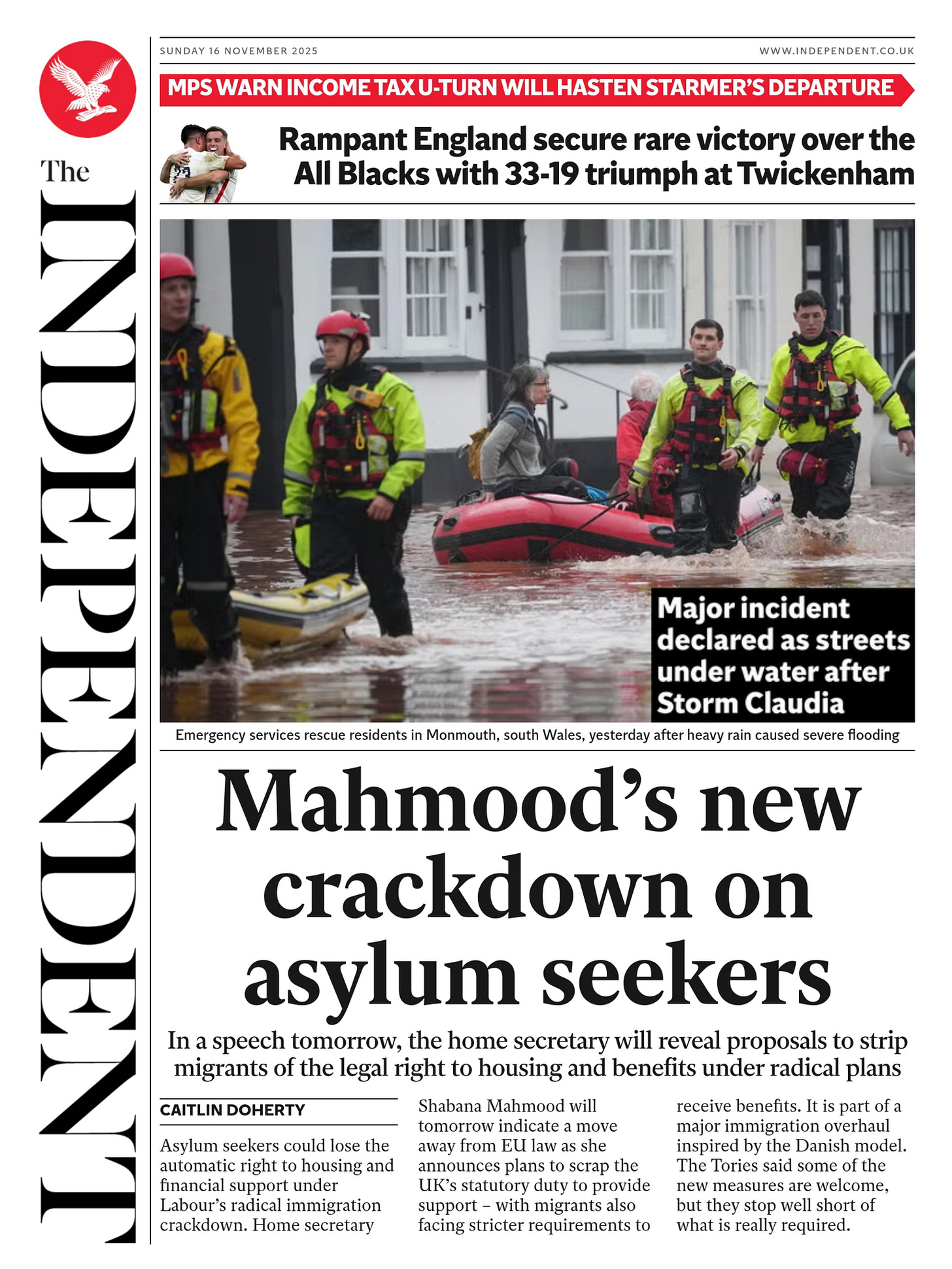Alarm Over Secretive Scheme to Fly Palestinians From Gaza to South Africa
A covert scheme to move Palestinians out of Gaza — with Israel allegedly facilitating flights to South Africa — is drawing sharp scrutiny and prompting an official investigation in Pretoria

Jordanian Analyst Raises Alarm Over Secretive Scheme to Fly Palestinians From Gaza to South Africa
Doha, Qatar - A covert scheme to move Palestinians out of Gaza — with Israel allegedly facilitating flights to South Africa via the remote Ramon Airport — is drawing sharp scrutiny from one of the most respected analysts on the Middle East and prompting an official investigation in Pretoria.
Amman-based political commentator, Osama Al-Sharif, told World Briefing that the operation remains “engulfed in mystery,” with key governments offering few explanations. South African authorities confirmed they are probing how two recent flights landed there carrying Palestinians who had departed from southern Israel under opaque circumstances.
According to Al-Sharif, the departures appear to be routed through Ramon Airport, a small airfield near the Israeli–Egyptian border.
“The Palestinian Authority has issued a warning to Palestinians - especially to people in Gaza — to beware of interlocutors or mediators who try to facilitate and help people to get out of Gaza through suspicious means,” Al-Sharif said. While Ramallah has avoided directly naming Israel, he argues the implication is clear: “Israel is trying to find ways to get people out of Gaza, particularly those with means who can afford it.”
Al-Sharif notes that Gaza’s desperation — compounded by relentless bombardment, economic collapse and the trauma of prolonged conflict — has created fertile ground for exploitation. “Let’s not be naïve,” he said. “There are definitely lots of people in Gaza who are really under stress after two years of a cruel war. They want to leave, and if they have the means to leave Israel will facilitate it. Israel is not shy about it.” Israel has openly said it will help Palestinians who choose to depart.
Uncertain Future for Those Who Leave
What happens to Palestinians who take these flights remains uncertain. Under the revived Trump-era plan now before the UN Security Council — a proposal that has been quietly modified but not fundamentally changed — Palestinians who leave Gaza are, in theory, guaranteed the right to return.
Al-Sharif is skeptical. “This could be symbolic language or political hyperbole,” he said. “There is no guarantee Israel would ever let them back in.”
South Africa’s role is equally opaque. Pretoria has condemned Israel’s actions in Gaza and brought genocide proceedings against it at the International Court of Justice — raising questions about why Palestinians are arriving there through a process apparently coordinated with Israeli authorities. One analyst said that unlike boats carrying asylum-seekers, aviation is a highly-regulated sector making it almost impossible for sketchy entities to evade entry requirements for a country such as South Africa.
South Africa’s role is equally opaque. Pretoria has condemned Israel’s actions in Gaza and brought genocide proceedings against it at the International Court of Justice — raising obvious questions about why Palestinians are arriving there through a process apparently coordinated with Israeli authorities. As one analyst noted on Al Jazeera’s Inside Story, unlike irregular boats carrying asylum-seekers, aviation is a highly regulated sector, making it almost impossible for shadowy actors to circumvent the entry requirements of a country like South Africa.
Al-Sharif describes the South African dimension as “a mystery,” noting that officials in Pretoria “had no clear explanation” for how the arrivals were arranged.
Part of a Larger Strategy?
The analyst warns that the Ramon Airport route should be seen in a broader context.
The airport was used in the early weeks of the war and was also floated as an alternative exit point for West Bank Palestinians during periods when Israel threatened to close land crossings with Jordan. Al-Sharif says the pattern suggests a long-term strategy.
“It has been promoted as a one-way ticket out of the occupied territories — possibly forever,” he said. “This appears to be part of a grand design: facilitating the deportation and displacement of Palestinians.”
A chartered plane carrying 153 Palestinians from war-torn Gaza – many without the required travel documents – landed at an airport near Johannesburg on Thursday morning, leaving South African officials “blindsided”. After nearly 12 hours of scrambling, the group was allowed to disembark into the care of a local charity organisation. “These are people from Gaza who somehow mysteriously were put on a plane that passed by Nairobi and came here,” South African President Cyril Ramaphosa said. He added that “it does seem like they were being flushed out” of Gaza. South Africa’s intelligence services are investigating the incident. More details have emerged about the scheme run by “Al-Majd Europe”, through which activists argue Israel is advancing its ethnic cleansing of Palestinians from Gaza. The Palestinian families, with a pregnant woman among them, boarded the plane not knowing their final destination, having paid Al-Majd $1,400 to $2,000 each – the price for children the same as adults. The group left from Ramon in a Romanian aircraft and transited through Nairobi, Kenya, before landing in Johannesburg. Officials said 23 Palestinians flew to other countries, without adding any more details. A man who was on board the plane told Al Jazeera there had been a similar flight to Indonesia in June. Al-Majd’s website also claims to have facilitated a trip for “a group of doctors working in hospitals in the Gaza Strip” who it flew to Indonesia “for further studies and advanced medical training”. However, this post is dated April 28, 2024. Al Jazeera could not independently verify the authenticity of this post and a photograph of the group in it - Al Jazeera
When Saudi Arabia’s Crown Prince Mohammed bin Salman meets with US President Donald Trump in Washington next week, expect big investments and fanfare. But beneath the pomp, what’s really at stake is Riyadh’s role in the new regional security architecture taking shape across the Middle East. The kingdom’s global standing — often framed as in need of repair — has long been restored. Saudi’s de facto ruler and Trump are planning the future of the US-Saudi relationship for decades to come. Israeli wars against Iran and its proxies have redrawn the geopolitical map, a reality officials in the region acknowledge privately even if it’s taboo to say aloud, with Washington now afforded a once-in-a-generation opportunity to stabilize “one of the world’s most violent regions,” according to a Foreign Affairs essay. Although normalization with Israel isn’t expected soon — Saudi Arabia insists a path toward Palestinian statehood is a prerequisite — Trump has brought it up with the crown prince, Axios reported. As for the deals, the most significant announcement is expected to be an executive order for a US-Saudi defense pact, mirroring guarantees recently extended to Qatar. Open questions remain over advanced weapons transfers, such as F-35 stealth fighter jets and AI chips, as well as cooperation on civil nuclear power - Semafor
The last time MBS visited the United States, it reportedly generated $450-billion in promised investments. This time upwards of $600-billion could come. Rather focused on energy and security, the transaction could focus more on technology transfer and access to innovation and investment, Al Jazeera reported. Separately, the Saudi Arabia’s sovereign wealth fund exited positions in nine U.S. companies, including Visa and Pinterest, as it cut its exposure to US stocks by 18% compared with the second quarter, the FT reported.
From Doha’s gleaming skyline to COP30’s faltering negotiations — today’s World Briefing connects the dots. Qatar’s rapid development is stunning, but keeping a desert city running takes enormous amounts of water. And as I reflect on that here in Doha, small nations at COP30 are still waiting for wealthy states to step up and pay for the climate damage they’ve helped fuel. In this video, I break down the contrast — and why it matters now more than ever.
Tymur Mindich, a prominent businessman and the alleged ringleader of a massive corruption scandal in Ukraine’s energy sector, used a luxury taxi service to leave the country for Poland hours before authorities launched raids in connection with their investigation, RFE/RL has learned. Reporting by Schemes, the investigative unit of RFE/RL’s Ukrainian Service, shows that Mindich used TimeLux, a luxury transportation company based in the western city of Lviv, and left Ukraine at 2:09 a.m. on November 10 in a Mercedes-Benz S 350 registered to one of the firm’s owners. Schemes learned the license plate number of the car from law-enforcement sources with access to data about Mindich’s border crossing and then tracked the car through social media posts to determine its owner. Mindich’s departure from Ukraine in the hours ahead of raids launched by investigators has sparked controversy. Ukraine’s anti-corruption watchdog has said it has found a “large-scale operation“ exposing tens of millions of dollars of graft in the energy sector in the midst of Russia’s full-scale invasion. Mindich’s involvement has also led to uproar due to his past connections to leading political figures, including Ukrainian President Volodymyr Zelenskyy. The use of the luxury taxi service offers new details about how Mindich, a 46-year-old well-connected businessman in Ukraine, left the country shortly before his home was searched by police on November 10 as part of one of the largest corruption scandals in the country since Moscow’s February 2022 invasion. The Mercedes-Benz S 350 belongs to 38-year-old Lviv-based entrepreneur Maksym Vovk, who records show is the director and lead owner of TimeLux. When contacted by RFE/RL, Vovk said that “the company does not check passengers’ documents” and that this responsibility rests with Ukraine’s border authorities.
Overnight Saturday and into Sunday, Russia launched an “Iskander-M” missile and 176 drones at Ukraine. In the Odesa region, critical energy infrastructure was hit - including a solar power plant. This is the first known major Russian hit on a renewable energy plant. Moscow’s campaign targeting energy infrastructure -- especially electricity production and an electrical grid that is battling to deliver power to millions of Ukrainians -- has knocked much of the country’s power suppliers offline, RFE/RL reported. Ukraine’s Energy Ministry said in October that generation capacity was around 17.6 gigawatts (GW), which is less than half the 38 GW before the war broke out in February 2022. And a cold winter, which is expected this year, could put consumption needs at around 18 GW. Nighttime temperatures in some parts of the country has been hovering close to freezing in recent days.
Britain announced over the weekend that it will begin the biggest review of its asylum policies in recent times. The plan is inspired by Denmark’s approach, which is seen as one of the strictest in Europe and has drawn criticism from human rights groups. Britain’s Home Office said in a statement that under the new reforms, aid will become “discretionary”, meaning it will be able to deny those are fit to work. On Monday, Mahmood will unveil more details of the measures, which the Home Office says are designed to deter illegal arrivals and speed up their repatriation. In the UK, the issue of immigration now overtakes the economy as voters’ top concern, according to polls. In the year to March 2025, more than 109,000 people applied for asylum in the UK, an increase of 17 per cent on the year before and 6 per cent surpassing the record high of 2002. Britain’s Home Office said its new reforms would be based on the models of Denmark and other European countries; countries where asylum is of a temporary nature, protections are offered conditionally and asylum seekers are expected to integrate into society - Euronews
China has warned its citizens against traveling to Japan as it escalates a backlash over comments by the country’s prime minister about Taiwan. The dictum is Beijing’s most substantive retaliation yet to Sanae Takaichi’s remarks. Even as it may be more symbolic than anything, the move suggests Beijing is willing to wield its economic heft to press geopolitical points, a well-worn playbook. Recent “blatantly provocative remarks on Taiwan” have “further damaged the atmosphere for people-to-people exchanges… creating additional risks to the safety and security of Chinese citizens in Japan,” a statement published by the Chinese Foreign Ministry said Friday. The ministry and its missions “remind Chinese citizens to refrain from visiting Japan for the time being,” it said. Following the announcement, a number of Chinese airlines including Air China, China Eastern and China Southern on Saturday published notices on their websites offering customers refunds or free changes on certain tickets to Japan, Chinese state broadcaster CCTV reported. The move by Beijing is its latest show of outrage in a roughly week-long row after Takaichi, in response to a question in Japan’s parliament, said that a Chinese attack on Taiwan would count as “a situation threatening Japan’s survival,” and thus could trigger a military response from Tokyo. China’s Ministry of Defense on Friday separately warned that Japan would “suffer a crushing defeat” if it dared to intervene militarily in the Taiwan Strait - CNN
U.S. President Donald Trump said he plans to sue the BBC for up to $5 billion over a misleading edit of his speech, after the broadcaster apologised but declined to compensate him. “We’ll sue them for anywhere between $1 billion and $5 billion, probably sometime next week,” Trump told reporters aboard Air Force One Friday evening. “We have to do it.” The BBC conceded on Thursday that edited footage of Trump’s Jan. 6, 2021, speech on its Panorama documentary program had unintentionally created “the mistaken impression that President Trump had made a direct call for violent action,” and said the segment would not be aired again. While Britain’s state broadcaster apologized to the president for the way it edited his speech, it said it would not offer financial compensation, as Trump has demanded. BBC chair Samir Shah sent a personal apology Thursday to the White House. Trump told reporters he had not raised the issue with Keir Starmer but that the British prime minister had asked to speak with him, according to media reports. “I’m going to call him over the weekend,” Trump said. “He’s very embarrassed,” he added. “I can say this, the U.K. is very, very embarrassed by the BBC,” Trump said. In an interview late Friday with GB News, Trump said he had an “obligation” to sue the broadcaster. “This is beyond fake. This is corrupt,” he said. “This was so egregious,” Trump told GB. “I’d like to find out why they did it.” - Politico





